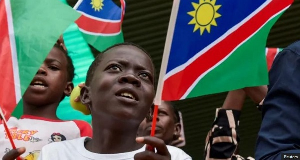I read a news report on the 27th of Feb., 2009 about the so called free falling Ghana cedi and its damning implication on the economy by the former national chairman of NPP. He said, “whereas the NPP administration was able to hold the exchange rate of the cedi to the dollar stable for eight solid years, NDC within the short period that they have been in power have allowed the local currency to depreciate against the dollar to unimaginable level”.
Is it not rather perplexing in this transient period of international financial crisis to be bombarded with news items about free falling Ghana cedi (Ghc)? How can an economy that was as solid as NPP claims it was simply collapse because the cedi fell by 4-5%? Is it not true that economies around the world are rumbling because of the current financial crisis? Why will an NPP administration hold the exchange rate stable? Don’t we have functioning markets in Ghana? Were they practicing price control?
The dramatic characterization of the trend in exchange rates for the dollar is unfortunate, and for many it is rather insulting. It will be natural to ask whether this is a misconception or ignorance. I do not have a straightforward answer to either of these questions. I am however certain that this cannot be prudent politics. I simply disagree with this statement for many reasons. First, exchange rate data do not support the proposition that the Ghana cedi is in a free fall against any of the major currencies. I looked at data from Jan. 2008 through Feb. 2009 and found no evidence to that effect. Analysis of percentage changes (monthly) shows that the largest change in exchange rate of the USD (circa 6.1 percent) occurred in June, 2008 (see figure below). It was followed by July, 2008 with a change of 5.8 percent, Jan. 2009 and Feb. 2009, 4.8 and 3.7 respectively.
Second, over the last few months many currencies across the globe have depreciated against the dollar. In other words the dollar has been appreciating drastically against these currencies. For example, the pound sterling was about 2 to 1 USD in June 2008 and in a couple of months it fell to 1.3 to 1 USD. Also, the Norwegian kroner depreciated by about 45% within a month or two. A few months ago, the Canadian dollar was almost at par with the US dollar but now it is US$1 to C$1.3. A critical look at exchange rates around the world shows similar pattern. But opposition parties in these countries have not made a big deal out of the situation. In these countries, the markets work and the exchange rates fluctuate according to the market dictates.
Is falling Ghana cedi necessarily evil?
In my view the answer is no and I will substantiate. My basis for this argument stems from the fact that remittances from citizens and others resident abroad come in foreign currencies that is the dollar, Euro, GBP, etc. In recent times, remittances have assumed new dimensions in developing countries such as Ghana and can easily be compared to foreign exchange/income earners such as Tourism, Cocoa, Coffee and others. So what are some of the implications of keeping the GH cedi/dollar rate stable? Suppressing the dollar is tantamount to keeping the price of cocoa down. The affected parties in this case are the hardworking ladies and gentlemen who do all kinds of work in a foreign land to support families back home and ultimately the families and relatives who are the receivers. For most parents, their children abroad serve as their cocoa farms, their pension funds, their welfare services etc. Our parents invests in our education and upbringing with the hope that one day we will be able to help ourselves and if they are lucky to live long enough, we may support them in their old age. In most well organized societies, these services rest with the government of those countries but that is not the case in Ghana.
Again, keeping the dollar down can be compared to increasing taxes on the poor. Note that in all those years where the dollar has been suppressed, inflation rates have been 2-4 times the growth of the dollar exchange rate. This implies that either remittances have to be increased to keep pace with inflation or the receivers have to live with reduced goods and services from the fixed amounts they get. For example a father or mother that receives a fixed amount of 100 USD a month with an inflation rate of about 15% and an increase of 5% in exchange rate, the person is down to 90 USD. The same applies to people having projects at home.
So, is falling Ghc bad for the economy? Certainly not if looked at from this angle.
I find the dollar exchange rate increases in Ghana to be helpful given the current financial crisis because once this crisis is global; Ghanaians abroad are struggling to cope with reduced wages/salaries. Many have lost their jobs and some more have to live with fewer hours while those who used to juggle two or three jobs in other to be able to pay their bills and have something left to send to their relatives no longer have that opportunity.
In conclusion, it is not evident that the cedi is in a free fall, and that it may be too early to start blaming the new government for the economic woes of Ghana. If the solid foundation that the NPP is claiming to have laid is true, then the economy should not collapse so easily.
Amin Ussif
Opinions of Thursday, 5 March 2009
Columnist: Ussif, Amin


















